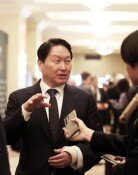Investment in ROK-U.S. Relations to Pay Off: U.S. Experts on Korea
Investment in ROK-U.S. Relations to Pay Off: U.S. Experts on Korea
Posted April. 16, 2008 03:26,
U.S. experts of Korean issues, participating in a project called, New Beginnings, announced yesterday that they expect the summit between Presidents Lee Myung-bak and George W. Bush to become a new starting point for a stronger South Korea-U.S. alliance.
Korea Society President Evans J. R. Revere, former acting assistant secretary of State for East Asian and Pacific Affairs, said, Although he is in the final stages of his term, President Bush can decide many things regarding South Korea-U.S. relations in the remaining nine months. Revere added, Discussions with President Bush regarding the vision for bilateral relations will be sustained by the next administration.
Former Deputy Assistant Secretary of State Michael H. Armacost said, Regardless of whoever becomes the next president of the United States, if the bilateral relationship is to be strong, it needs bipartisan support. It is important that President Lee is not coming just to meet President Bush.
Korea Economic Institute President Charles L. Pritchard, former U.S. special envoy to North Korea, said that South Korea should not be obsessed with short-term national interests in the bilateral summit. He emphasized, If South Korea wants to continue the development of bilateral relations, it should consider investing in the relationship with a long-term perspective. He added, Although President Bushs term is nearly up, an investment today is bound to pay off.
They also emphasized the fact that the venue for the summit will be Camp David.
Pritchard said, The fact that President Bush, who values personal bonding, invited President Lee to Camp David means that he acknowledged Lee as his friend. This is a symbol of restoring the alliance.
However, Armacost said, You dont need to see the summit simply as a symbol of the alliances restoration. Itll also cover many pending issues, including not only how to deal with Pyongyang, which strongly condemns Lee, but also ratification of the KORUS FTA.
On why the report was written, Revere said, It is the common view of all participants that we need to minimize trial and error by including all information that the new resident of the White House might want to know for the development of Korea-U.S. relations.
Armacost noted, In the past, U.S. administrations often wasted their time in the first year of their terms to revisit policies over the bilateral relationship.
triplets@donga.com







